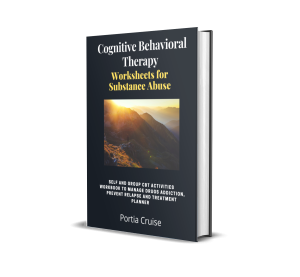If you have ever wondered what the role of workbooks in group therapy for substance abuse treatment is, then this workbook will clear your doubts. Millions of individuals worldwide are impacted by the prevalent issue of substance misuse. Cognitive-behavioral therapy (CBT) can be a useful medication-assisted treatment in addiction recovery for regulating drug use, avoiding relapse, and attaining long-lasting recovery for persons who are battling addiction.

The “Cognitive Behavioral Therapy Worksheets for Substance Abuse” by Portia Cruise are a great source for CBT exercises and worksheets that can help a loved one find the right addiction treatment program.
In this extensive workbook, Portia Cruise offers a variety of individual and group exercises that have helped many patients around the world manage their substance abuse problems.
These exercises assist patients in recognizing and altering harmful thought patterns and behaviors. In addition to that, victims of substance abuse who have used it have found that it helps them develop coping mechanisms, and sets up a support network for recovery. The exercises in this workbook are supported by research and based on the most recent findings in cognitive-behavioral therapy and addiction treatment.
In this blog post, we’ll look closer at the “Cognitive Behavioral Therapy Worksheets for Substance Abuse Workbook” by Portia Cruise and how it can be used by therapists, counselors, and individuals looking to overcome addiction and live healthier, happier life.
Section 1: Workbook Overview
The Cognitive Behavioral Therapy Worksheets for Substance Abuse is divided into two parts: the first part is designed for individuals to use on their own, while the second part is geared towards group therapy settings. The workbook is based on the principles of CBT and emphasizes the importance of identifying and changing negative thought patterns and behaviors that contribute to addiction.
Section 2: Self-Care Activities
Very few books can provide the kind of activities that Portia has provided in this section. The workbook’s self-care exercises are designed to assist patients in laying a solid foundation for recovery. These tasks include establishing goals, creating healthy behaviors, and figuring out what makes people use drugs to manage stress, stay active, and keep a good mindset. Patients are advised to develop a self-care plan.
Section 3: Group Activities
The group activities in this section are designed to help substance abuse victims develop positive interpersonal relationships and boost social support. Group conversations, role-playing games, and skill-development exercises are some of these activities. Victims of substance abuse are encouraged to collaborate to aid in each other’s rehabilitation and to share their experiences, difficulties, and accomplishments with the group.
Section 4: Relapse Prevention
This workbook understands the importance of aftercare in addiction treatment. It is one of the few workbooks that focuses heavily on relapse prevention, which is why a section on preventing relapse was created for it. The workbook offers a variety of relapse prevention techniques, such as recognizing triggers, acquiring coping mechanisms, and formulating a relapse prevention strategy. Victims of substance abuse are encouraged to actively participate in their healing and to develop the skills necessary to sustain long-term sobriety.
Anyone wishing to fight addiction and achieve long-term recovery should turn to Portia Cruise’s Cognitive Behavioral Therapy Worksheets for Substance Abuse as a helpful tool. This workbook gives victims of substance abuse the tools they need to take charge of their lives and lay a solid foundation for a healthy, happy future by offering evidence-based CBT exercises and worksheets.
The exercises in this workbook, whether utilized in individual or group therapy settings, are an effective means of controlling drug use, avoiding relapse, and bringing about long-lasting transformation.
To learn more about the book on Amazon, you can click here